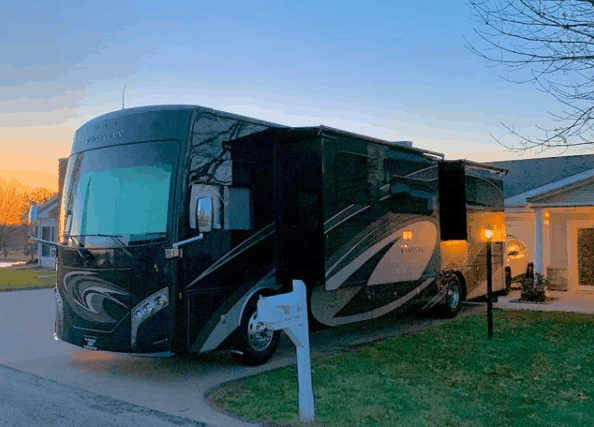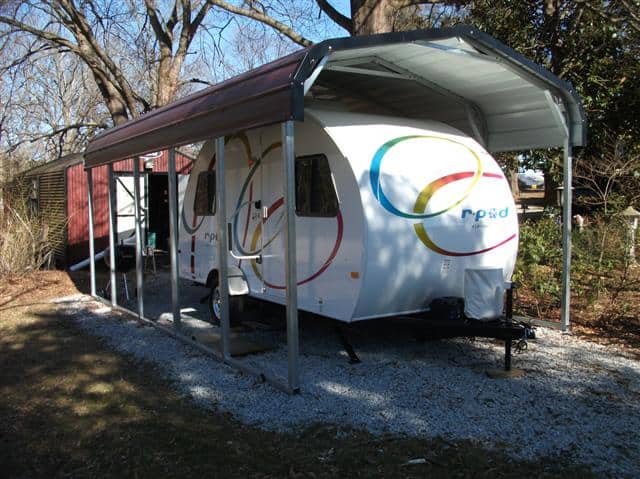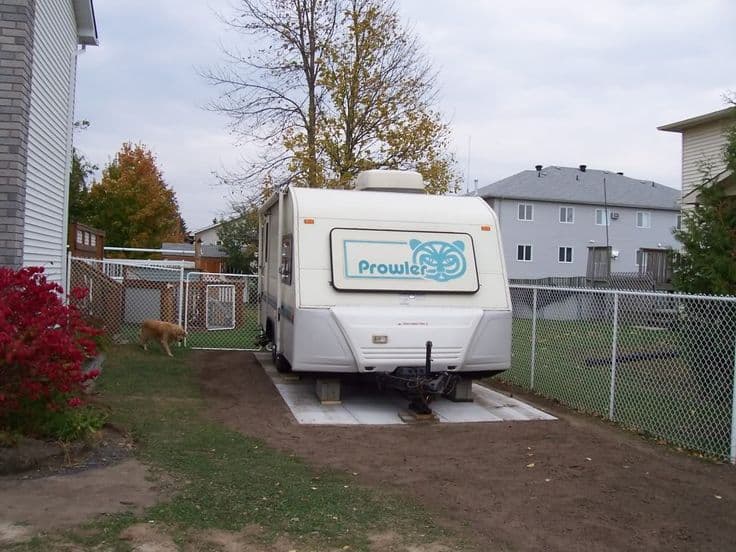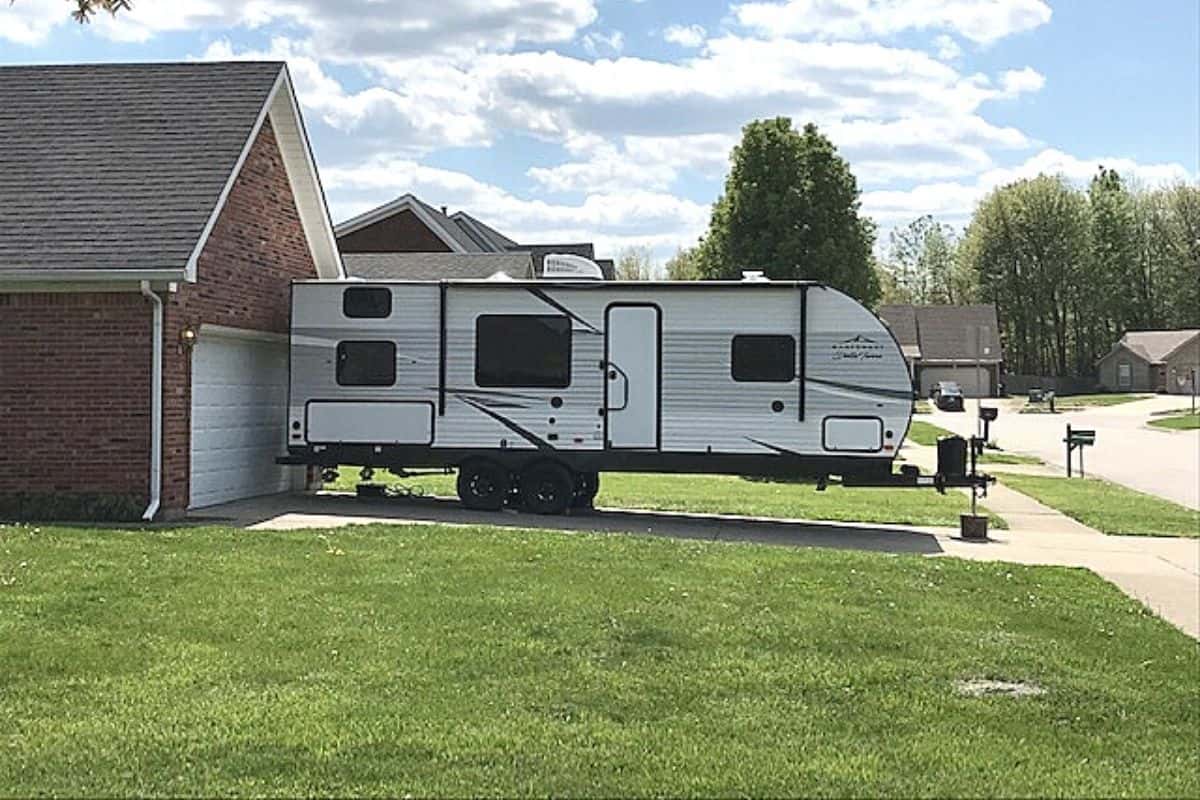One of the biggest concerns, as an RV owner, is trying to figure where to park and store the RV when you’re not using it.
And often the first place most people think to park their RV is in their driveway in order to avoid the often high cost of RV storage facilities.
However, if you plan to park your RV in the driveway or at your house there are several things you need to be aware of before doing so.
Can You Park an RV in Your Driveway?

There are many things to consider and know before trying to park an RV in your driveway to avoid potential citations and fines as well as logistical issues.
Restrictions and Rules Against Parking an RV in Your Driveway
One of the most common issues with trying to park an RV in a driveway is homeowner associations and covenants and restrictions which prevent RVs from being permanently parked in your driveway, at your house, or anywhere in the neighborhood for that matter.
These rules and regulations in neighborhoods are usually put into place to protect the enjoyment as well as the property values for all residents in that particular neighborhood.
But even if your neighborhood doesn’t have an active neighborhood association or enforced covenants and restrictions, there could be town or county ordinances that would prevent you from parking an RV in your driveway as well.
So before you park your RV in the driveway or at your house, it’s important to check to make sure there are no neighborhood restrictions or country ordinances that would prevent you from doing so.
What Size RV will Fit in a Driveway?
Another thing to keep in mind when trying to park an RV in the driveway is how big your RV is and whether or not it will even fit.
Usually, class B RVs and small travel trailers won’t have an issue fitting on a driveway but class A or C motorhome, as well as large fifth-wheel trailers, can due to their length.
This is because the average driveway is usually 18 to 20 feet long, while a large class A or class C motorhome or large travel trailer such as a fifth wheel can easily be 30 feet or longer.
Meaning if you tried to park a large RV or fifth wheel into a standard driveway, 10 feet or more of the RV would stick out into the street.
Because of this, if you want to park an RV in your driveway, it’s best to keep the length of your RV to no more than 20 feet.
Will an RV Damage a Concrete Driveway?

It’s not just the length of the RV you need to be concerned about though when trying to park an RV on a driveway but also its weight.
This is because RV weights can often far exceed the recommended load limits of your driveway, potentially causing damage as well as cracking to the driveway.
Maximum Weight for a Concrete Driveway
A standard residential driveway is typically a 4-inch slab and meant to withstand loads of up to 8,000 pounds.
The problem with this 8,000-pound load limit for driveways though, is that RV’s especially motorhomes are often well over 10,000 pounds and can often weigh more than 20,000 pounds.
Which could easily damage your concrete driveway and cause cracking and damage over time.
Don’t Forget About Driveway Slope
Even if you have a long enough driveway and your driveway can adequately handle the weight, you still might have issues when trying to park an RV in the driveway because of the driveway’s slope.
The thing to remember here especially on large RV’s and motorhomes is that it’s not uncommon for RVs to extend as much as 5 feet or more beyond the rear wheels.
This can cause a real issue if you have a steep slope to your driveway, as it can cause the bumper or the RV to drag along the ground when trying to navigate the steep slope.
Potentially causing damage to the bumper or undercarriage of the RV as well as damage to the driveway.
Impact on the Neighbors
The last and perhaps the most important thing to consider before parking an RV in your driveway is the impact it will have on your neighbors.
Because even if there are no neighborhood restrictions or rules against parking an RV in your driveway, you may still not want to do so, in order to persevere the good relationships you have with your surrounding neighbors.
The thing to remember here is that while you might not mind looking at your RV in the driveway, you can be almost certain your neighbors will.
Because a large RV parked in the neighborhood can have a huge impact on the neighborhood and surrounding houses as it can be very overbearing as well as block the sightlines of your neighbor’s houses.
Also, a large RV parked in a neighborhood can potentially negatively affect the property values of the surrounding houses.
Which is why many homeowner associations prevent RVs from parking in the neighborhood in the first place.
Can You Park an RV in Your Backyard?

The next most popular place to park an RV after the driveway is in the backyard.
Because an RV parked in the backyard is usually much less noticeable than an RV parked in the driveway.
However, parking an RV in your backyard has its own set of challenges to contend with.
Restrictions and Rules Against Parking an RV in Your Backyard
While an RV will certainly be less noticeable in the neighborhood when it’s parked in the backyard as opposed to the driveway, neighborhood associations and restrictions will still more than likely be an issue in many neighborhoods even in the backyard.
Because often neighborhood covenants and restrictions prevent RVs from being parked anywhere on the property and not just in the driveway.
So the first thing to do check before parking your RV in the backyard is to see if there are any rules or restrictions either in your neighborhood or in the town you live in that would prevent you from doing so.
Is There Enough Distance Between the Houses?
The next big obstacle you might run into when trying to park an RV in your backyard is whether or not you can even get the RV into the backyard in the first place.
This is because many modern neighborhoods often only have 10 feet or less of space between houses which would not allow you enough space to get an RV down the side of the house and into the backyard, without encroaching into your neighbor’s yard considering the average RV width is a little over 8 feet wide.
Not to mention other obstacles you might run into when trying to get an RV into the backyard such as backyard fences, AC units, trees, and uneven or wet ground.
Where to Park an RV in Your Backyard
The last consideration if you plan to park an RV in your backyard is where to park the RV.
This is an important consideration because oftentimes backyards are not always the best place to park an RV due to wet or soggy ground, excessive or large trees, as well as uneven or unlevel ground.
So if you plan to park an RV in your backyard, use the below criteria to help choose the best spot in your backyard for the RV.
Best Place to Park an RV in your Backyard
- Look for an area in your backyard that has the high ground compared to the rest of the backyard and avoid drainage or wet run-off areas in the yard to keep your RV and RV tires nice and dry when parked.
- Find an area in your backyard free from trees and large branches to avoided damage to your RV from fallen branches and limbs.
- While most backyards will not be completely level, look for an area that is as level as possible or can be made level with gravel or fill dirt.
- For permanent backyard RV storage, consider adding an RV parking pad, using either concrete or tightly packed gravel as well as an RV cover, to help keep the RV dry and prevent it from becoming stuck.
What is the Best Surface to Park an RV On?

When parking your RV for storage, you want to avoid parking your RV in dirt or grass as this can cause considerable damage to your RV tires due to the moisture in the ground and can also lead to bug and insect issues inside the trailer.
Below are the two best surfaces to park your RV on.
Concrete Pad Designed for the Size and Weight of the RV
- A concrete pad provides an excellent moisture barrier between RV tires and ground moisture helping to preserve the life of the RV tires.
- Concrete pads provide an extremely level surface for RV parking.
- Concrete pads help to discourage bug and rodent infections inside the RV.
However, due to the heavyweight of a typical RV, make sure the concrete slab is thick enough and reinforced enough to handle the extreme weight of the RV to prevent cracking and damage to the concrete pad over time.
Packed Gravel
If your working with a tighter budget, a well-packed gravel pad is a great second choice to park your RV on, as it will keep the RV tires out of the dirt and mud and will also provide somewhat of a level ground to park the RV on.
Wondering if you can park in a hotel parking lot while traveling with an RV? If so, check out our article “Can You Park an RV at a Hotel? What You Need to Know“.
Recent Posts
Are you ready to hit the open road in your RV? Before you set off on your adventures, it's crucial to have the right RV travel tips and RV accessories up your sleeve. As a seasoned RVer, I've...
47 RV Storage Ideas to Maximize Your Space for Compact Living
Camping and living in an RV is an incredible adventure, but it comes with its fair share of challenges, particularly around storage, due to the lack of space. Because of this, it's a must to make...

